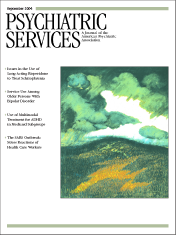Impact of Family Burden and Affective Response on Clinical Outcome Among Patients With Bipolar Disorder
Abstract
OBJECTIVE: This study evaluated the direct and indirect effects of family burden and affective response on medication adherence and outcome among patients with bipolar disorder. METHODS: Data were examined for 126 patients who were consecutively admitted to the psychiatric service at a university-affiliated hospital and who met research diagnostic criteria for bipolar I or II disorder or for schizoaffective disorder, manic type, and their family caregivers. A total of 101 pairs of patients and family caregivers (80 percent) completed 15 months of study and were included in the analyses. Patients and their identified caregivers were assessed within two weeks of either discharge from the index inpatient admission or initiation of outpatient treatment (baseline assessment). Patients and caregivers were also assessed seven and 15 months after the baseline assessment. Structural equation modeling was used to evaluate caregivers' influences on patients' medication adherence seven months after baseline and on clinical outcome 15 months after baseline. RESULTS: The indexes of overall fit for the path model confirmed the a priori measurement model. Significant paths were found from the caregiver's perceived burden at baseline to the caregiver's emotional overinvolvement at baseline, from the caregiver's emotional overinvolvement at baseline to the patient's medication adherence at the seven month follow-up, and from the patient's medication adherence at the seven-month follow-up to the patient's outcome at the 15-month follow-up. The paths from the caregiver's perceived burden at baseline to the patient's medication adherence seven months after baseline and the patient's outcome 15 months after baseline were not significant. CONCLUSIONS: When caregivers of patients with bipolar illness experience a high burden, patient outcome is adversely affected. This relationship is mediated through families' affective response and patients' medication adherence.



